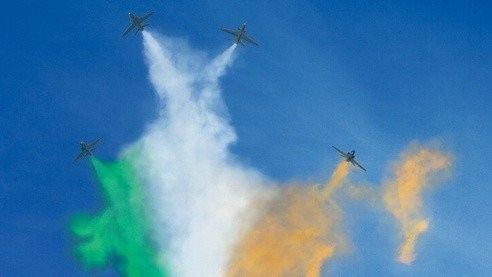Armed Forces
British “Spearhead” Ready – Involvement of the Polish Army
At the beginning of the year, a new composition of the NATO VJTF component has reached combat readiness. The element is being commanded by the British. The multi-national brigade also includes the Polish units.
This year, NATO rapid reaction force is going to be founded around the British 20th Armoured Infantry Brigade which is expected to be the commanding unit, also contributing elements utilizing the Challenger 2 main battle tanks and Warrior IFVs, to the VJTF. British Army is also going to have its artillery units, light infantry, engineering, air defence, army aviation, communications or military police elements involved in the VJTF this year.
The main assumption on which VJTF is founded is that it is a unit which is operated in a multinational setting. Thus, alongside the British units, Polish elements (mechanized combat group), Spanish units (a combat group of infantry with artillery battery, and mechanized and engineering companies) or a Danish mechanized battalion combat group with reconnaissance and CIMIC elements, would be involved in the NATO component mentioned above. The contingents, often involving smaller elements, will also be contributed by Albania, Croatia, Czech Republic, Estonia, Latvia or Romania. The information regarding the VJTF composition has been published by the British on occasion formed by one of the exercises.
The available information, including the release published by the Polish General Command of the Armed Forces, regarding the engagement of the Polish soldiers in the Noble Ledger certifying exercise, suggests that the Polish Combat Group would involve the 10th Dragoons Mechanized Battalion (listed as the one involved in the VJTF operations), being a part of the 10th Armoured Cavalry Brigade based in Świętoszów. The said unit operates the BWP-1 IFVs.
This is yet third “spearhead” package created, shadowing the Wales summit. The first temporary package consisted, above all, of German, Norwegian and Dutch elements, along with, for example, a Polish Leopard 2A4 tank battalion of the 10th Armoured Cavalry Brigade. The second package, on the other hand, involved Spanish, British and Albanian light infantry units, as well as a Polish Leopard 2A5 tank battalion of the 34th Armoured Cavalry Brigade.
During 2015 and 2016, Brilliant Jump and Noble Jump exercises, which involved deployment of some of the “Spearhead’s” elements to Poland, took place. The assumption on the basis of which the VJTF unit is operated anticipates that the element would be ready to deploy in 5-7 days (with some elements being ready in 2 days), which would make it possible to rapidly deploy the component in the area within which the crisis emerges.
Creation of the “Spearhead” is a result of adoption of the provision of the NATO summit in Newport, organized back in 2014. There, applicable decisions have also been taken, regarding the reform of the allied response forces. At the moment, the component involves 40 thousand soldiers, including three brigades of land forces – before the reform, only one element of this type was expected to be a part of VJTF.
Each of the multinational sets of NATO Response Force brigades remains on alert for three years, whereas the highest level of combat readiness (acting as a “Spearhead”) is attained during the second year of the said period. According to the available information, the VJTF forces that remain on alert during the preceding year shall now be ready to be deployed in maximally 30 days, while the units getting ready to become a “Spearhead” element during the upcoming year, shall attain such capability in up to 45 days.
Poland is included among the framework nations which have submitted their candidacies to command the land component of the VJTF unit. Most probably, Polish “Spearhead” would reach its readiness in 2020. Last year, the same role has been assumed by Spain, and Germany took on this responsibility two years ago (with support provided by the Dutch).
It shall be remembered that the VJTF unit, as well as the whole response force, both play a significant role in the NATO defensive planning initiatives. These elements would be the first ones to support the battalion combat teams in Central-Eastern Europe, stationed there on the basis of the arrangements made during the NATO Summit in Warsaw, should a threat emerge. One should also remember though that VJTF is to react in any area, with a particular accent placed on the NATO limits, not only understood as the “Eastern Flank”. The decisions whether the VJTF should be employed, or not, are made by the North Atlantic Council.

